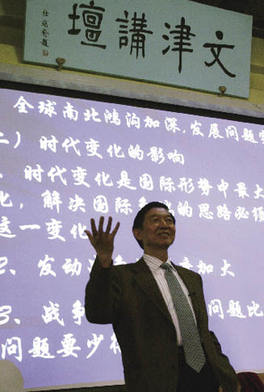| Grace Under Pressure: My Dance with Diplomacy
Narrated by WU JIANMIN & collated by staff reporter ZHANG JUAN
Wu Jianmin is a celebrated Chinese diplomat. He served as head of the Information Department and spokesperson of the Foreign Ministry, ambassador to the Netherlands and to France, and president of China Foreign Affairs University. He is currently a professor in China Foreign Affairs University, and academician of the International Eurasian Academy of Sciences and the European Academy of Sciences.
NEW China has always adhered to a peaceful foreign policy since it was founded, though the details and emphasis of policy may have varied over time and in application. Over the past 60 years, I've lived through the dramatic evolution of Chinese diplomatic policy – from seeking survival to seeking development, from sitting on a small stage to standing in a large arena, from trying to work out differences to proceeding from similarities, and from antagonism to cooperation.

Survival and Alignment
In the early days of the People's Republic, very few countries were brave enough to establish diplomatic ties with New China. The number of countries that exercised that option increased from 23 in 1955 to 62 in 1971, reached 116 in 1979, and currently stands at 171. China's diplomatic stage extends over the entire world now, which was simply unimaginable 60 years ago. At that time, Premier Zhou Enlai had only a few Asian and African countries to visit. European and American countries were simply out of the question, whereas now our premier and foreign minister have ample options.
"Survival" was the immediate concern of New China, and in its initial period Chinese diplomacy tried to break the isolation imposed by Western countries by uniting with Asian, African and Latin American counterparts and supporting their national liberation movements. Politics dominated Chinese diplomacy at the time. From 1965 to 1971, I worked as Foreign Ministry interpreter and on many occasions served Chairman Mao Zedong, Premier Zhou Enlai and some other state leaders in this capacity. As I remember that time the Chinese diplomatic scope was narrow; "struggle" was roughly what it was all about. For a long period, we struggled with the United States and the Soviet Union. The popular jargon at the time was "crush the opponent."
I twice acted as Chairman Mao's interpreter – the first time in November 1965 when the wife of President Alphonse Massamba-Debat of Congo-Brazzaville visited China, and then in October 1968 when its Prime Minister Ambroise Noumazalay came to Beijing. China's attitude was very clear then: because China had struggled for its own independence and liberation, it would also support corresponding movements in African countries. Through mutual support, China aimed to establish a worldwide united front against imperialism and colonialism.
I was a French interpreter, and worked for Premier Zhou between 1965 and 1971. Most of his visitors were state leaders from African and Asian countries, though there were exceptions when I was needed for visiting officials from France.
The meeting that I remember most vividly was a visit made by Prime Minister Alfred Raoul of Congo-Brazzaville to Beijing in September 1969. Mao Zedong met the delegation, and Premier Zhou held a long talk with them – from 11 pm till 5 am the next morning. This was the first time that I interpreted for the premier at such an important exchange. The Congolese prime minister briefed Premier Zhou on the political situation of the Central Africa – the Franco-American struggle for spheres of influence in the region and how the Congo was caught in the middle of these antagonistic forces. He informed the Chinese premier that his government planned to nationalize French-controlled railways and harbors by the end of 1969, and asked for China's advice on how to manage such a showdown with the French. Premier Zhou advised President Marien Ngouabi to first tackle the most urgent task – which was, for the time being, to strengthen his military power and consolidate his regime. He cautioned that the nationalization plan would make an enemy of France and Congo's immediate neighbors. He submitted to him there was a possibility that unilateral nationalization would "drive the wolves out the front door, while tigers steal in through the back." Congo "must be alert to the more dangerous enemy – the American imperialists – on the other bank of the Congo River," warned the Chinese premier.
Prime Minister Raoul was convinced and said he would accept China's advice on dealing with France. The talk then moved on to financial and military aid for the Congo and plans for economic and technological cooperation between our two countries. Congo hoped that China would provide more substantial economic support, but Premier Zhou explained honestly that it was impossible for China to satisfy all their demands. He suggested instead reciprocal trade for mutual benefits. Premier Zhou quoted the Chinese proverb: "A river in the distance won't quench your present thirst," reminding us all that a country must rely on itself for its independence and prosperity.
It is clear that the Chinese approach to diplomacy at that time was to unite with all the forces that were sympathetic with us and collaborate on all the factors that would route others to our cause, since we were all struggling for national independence. Many Asian and African countries were trying to safeguard their independence. It was the same for China.
| 
